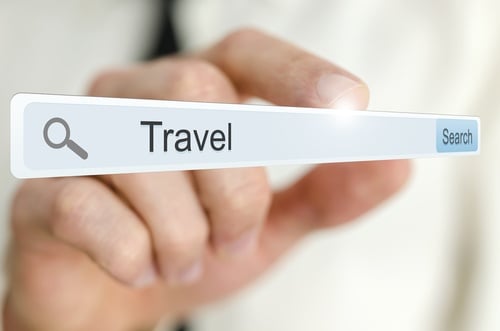The Connectivity of Travel: Top Technologies
By Nick Ostdick on Jun 21, 2016 9:44:42 AM

 Travel and tourism are both ostensibly about making connections, whether it be with the people you meet during your journey or with the culture and landscape of your destination. It’s about creating dynamic, symbiotic experiences that come with learning about new people and places with similarities and differences from your own life experience.
Travel and tourism are both ostensibly about making connections, whether it be with the people you meet during your journey or with the culture and landscape of your destination. It’s about creating dynamic, symbiotic experiences that come with learning about new people and places with similarities and differences from your own life experience.
Which is why is make sense that the travel industry is built on connections and interactions between several different entities throughout a travel company’s value chain to provide the very best value and experience for customers. A complex distribution system of retail travel agents, travel service wholesalers, and local tourism agencies who contract with wholesalers all work to provide travelers with the knowledge, products, and services to ensure a smooth, hassle-free travel experience.
In order for reseller networks to be truly cost-efficient and productive aspects of the travel industry landscape, they need to leverage the right technological platforms. Here are 3 top technologies agencies must utilize to remain value added propositions for customers and a global travel and tourism marketplace.
Cloud-based Data Storage
A large majority of data management and reporting in today’s travel industry relies on the use of Big Data to help identify value propositions in new and emerging markets, customer purchasing trends, and where today’s travelers are spending their time and resources when it comes to researching and booking travel plans. With its flexibility, agility, and responsiveness in storing, retrieving, and analyzing large pools of data, cloud technology has become a key driver in recent years for reseller networks to remain competitive and viable. Cloud data storage also gives reseller networks the power to view, share, analyze, collaborate, and act on data in real-time from a variety of access points, fostering enhanced communication across a network’s value chain.
The enhanced and accessibility and analytic capabilities of cloud-based storage allow reseller networks to review actions in the moment and make adjustments to products and services to best fit a wide-variety of scenarios - for example, new, easily accessible data about the rise of the experimental or ‘whim-based’ traveler would allow a reseller network to better position travel packages or excursions to best target those experimental travelers who desire unique destinations on budget-friendly platforms.
ERP Systems
While much of a agency’s focus is front-facing or customer based, so much of successful customer interaction is based on internal or operational capability. Streamlined, efficient workflows behind the scenes are a core driver in providing the highest levels of customer service and operating a truly lean business platform. ERP systems, with their capability to optimize the flow of transaction, product and operational data between various workflows, locations and geographies, are key in this endeavor.
Travel ERP systems replaces silos of isolated, unstructured data and business activities with a common data model and standardized, automated processes for operational areas formerly supported by diverse software applications - rather than multiple applications working toward a single goal, these functions are combined into a single platform with several integrations working toward the same end. Common data and standard processes create an environment in which operational data can be timely, reliable, consistent, and easily shared across all touch points of a company’s value chain, enhancing visibility and agility.
Integrated Booking and Reservation Management Solutions
It’s safe to say without intelligent, integrated booking and reservation software solutions, the value proposition of reseller networks would be questionable. As such, travel reseller networks need to leverage these software solutions to provide real-time booking and reservation capabilities to customers, but also to increase transparency and maneuverability internally to respond to alterations, modifications, or cancellations whether in transportation, lodging, or excursions.
In today’s fast-paced travel market, resellers need access to systems capable of providing real-time access to detailed capacities and availability; pricing; multiple/alternative rates; special deals and promotions; stop sales and cancellation policies. In addition, when it comes to reservation management, resellers also need the ability to track reservations online as well as monitor order statuses, voucher generation, pro-forma invoices, reservation amendments or alterations.
While there are other technologies reseller networks should leverage in order to operate in as optimal ways as possible - social media, mobile app platforms, and response websites to name a few - these are perhaps three of the most substantial and integral technologies reseller must deploy in order to remain strong value propositions for customers and the travel industry at-large. Incorporating these technological platforms will help keep reseller networks relevant as the travel industry continues to undergo rapid change and growth in the years to come.
Why should you invest in travel technology?
This is a question every manager in the travel industry should be asking themselves, because the thought process behind a serious answer will jumpstart – or clarify – a reasoned foundation for a strategic role and direction for technology.
- travel technology (60)
- Travel Industry (49)
- travel agency (31)
- travel erp (31)
- travel trends (28)
- travel booking system (23)
- TINA (21)
- travel company (19)
- Tour Operator (18)
- Product updates (17)
- Travel Management Company (17)
- AIDA (15)
- TBS (15)
- Business Travel (14)
- dcs plus news (14)
- tour operator solution (14)
- travel website (14)
- travel erp system (13)
- Mobile App (12)
- Travel App (12)
- mid back office solution (12)
- trends (12)
- Corporate Travel (11)
- Industry Events (11)
- Mobile Technology (11)
- TMC (11)
- travel agents (11)
- erp (10)
- erp system (10)
- Tour Operators (9)
- Travel booking engines (9)
- dcs plus (9)
- online travel agency (9)
- travel agent (9)
- Mobile Bookings (8)
- travel (8)
- travel agencies (8)
- 2017 (7)
- Business Traveler (7)
- Mobile Travel (7)
- travel business (7)
- travel software (7)
- Digital Technology (6)
- Insider (6)
- Millennials (6)
- Online booking systems (6)
- Travel Management Companies (6)
- process automation (6)
- travel companies (6)
- Big Data (5)
- Partners interviews (5)
- Tour Operator Software (5)
- customer retention (5)
- travel agency technology (5)
- Booking engines (4)
- CSBT (4)
- Mobile Device (4)
- Mobile travel apps (4)
- OTAs (4)
- Static databases (4)
- Tour Companies (4)
- Travel Policy (4)
- Travel booking systems (4)
- Travel suppliers (4)
- back office automation (4)
- corporate self booking tool (4)
- millennial travelers (4)
- online travel (4)
- responsive travel website (4)
- technology (4)
- travel website conversion (4)
- 2016 (3)
- Content mapping (3)
- Databases (3)
- Demographics (3)
- Food and Adventure Tourism (3)
- Mobile Apps (3)
- Travel Distribution Channels (3)
- Travel Management Software (3)
- Travel customers (3)
- Travel history (3)
- anniversary (3)
- automated processes (3)
- content matching (3)
- global travel industry (3)
- social media (3)
- travel agency workflow (3)
- travel back office (3)
- travel marketing (3)
- travel process automation (3)
- AI in travel (2)
- Advanced Booking Systems (2)
- B2B Travel Resellers (2)
- Bleisure (2)
- Branding (2)
- Business Process Automation (2)
- Business Travelers (2)
- Customer engagement (2)
- Financial Reporting (2)
- Food Tourism (2)
- Inbound Marketing (2)
- Infographic (2)
- Leisure Travel (2)
- Saas (2)
- Templates (2)
- Travel Costs (2)
- Travel bookings (2)
- Travel start-up (2)
- Travel website abandonment (2)
- WTM 2016 (2)
- abandoned travel bookings (2)
- engagement marketing (2)
- internet booking engine (2)
- millennial traveler (2)
- new travel company (2)
- office (2)
- online reputation management (2)
- online travel reviews (2)
- reporting (2)
- software (2)
- start-up tips (2)
- travel agency management (2)
- travel agency website (2)
- travel experience (2)
- travel mobile app (2)
- travel packages (2)
- travel reservation system (2)
- travel system (2)
- travelers (2)
- web-based travel erp (2)
- 2020 (1)
- 360 Customer View (1)
- Advanced Accommodation Contract Management (1)
- Adventure travelers (1)
- Apps (1)
- B2B Reseller (1)
- B2B Resellers (1)
- B2C (1)
- BI Reporting (1)
- Budget traveler (1)
- Cancellations (1)
- Chat (1)
- Chinese millennial (1)
- Cloud (1)
- Cognitive computing (1)
- Comparison shopping (1)
- Conference (1)
- Contact matching (1)
- Content (1)
- Cruise (1)
- Culinary traveler (1)
- Customer relations (1)
- Digital Innovation (1)
- Digital Natives (1)
- Documents (1)
- Emerging market travelers (1)
- Emerging markets (1)
- Errors (1)
- Experimental travel (1)
- Financial Dashboard (1)
- Import rates (1)
- Instant messaging (1)
- Integrate with Accounting Software (1)
- Internet (1)
- Luxury traveler (1)
- Mobile Transaction (1)
- Mobile payments (1)
- NDC distribution (1)
- Operational Reporting (1)
- Reseller networks (1)
- Resellers (1)
- Response (1)
- Subagents Network (1)
- TINA Academy (1)
- TTE (1)
- Travel Reseller Network (1)
- Travel Revenue Management (1)
- Travel booking problems (1)
- Travel finance reporting (1)
- Travel stats (1)
- WTM (1)
- abandonment (1)
- accomodations (1)
- advanced reporting (1)
- airline direct connect technology (1)
- ancillary services (1)
- cloud computing (1)
- collection (1)
- collection challenges (1)
- common data model (1)
- conversion rates (1)
- corporate mobile app (1)
- cost control (1)
- credo ventures capital invests in dcs plus (1)
- customer reviews (1)
- data analysis (1)
- dcs plus credo investment (1)
- dcs plus credo ventures (1)
- deloitte technology fast 500 EMEA (1)
- digital transformation (1)
- e-invoicing KSA (1)
- email marketing (1)
- email marketing for OTAs (1)
- erp e-invoicing (1)
- lost travel bookings (1)
- modern travel agencies (1)
- networks (1)
- new features (1)
- offers (1)
- online customer review (1)
- online reputation (1)
- online travel agencies (1)
- risk management (1)
- sales (1)
- senior travelers (1)
- shopping baskets (1)
- shopping carts (1)
- social network (1)
- standardized processes (1)
- static content (1)
- travel SaaS (1)
- travel account services (1)
- travel agency customers (1)
- travel agency profitability (1)
- travel analytics (1)
- travel blog (1)
- travel planning (1)
- travel reviews (1)
- travel shopping carts (1)
- travel software for agencies (1)
- travel software system (1)
- travel technology europe (1)
- travlist smart mobile app (1)
- trend (1)
- trusted adviser (1)
- trusted advisor (1)
- upsell functionality (1)
- vouchers (1)
- website traffic (1)
- zatca (1)
Subscribe by email
You May Also Like
These Related Stories

The Perks of Working With a Traditional Travel Agency

Why Your Travel Company Needs a Travel Booking System


No Comments Yet
Let us know what you think